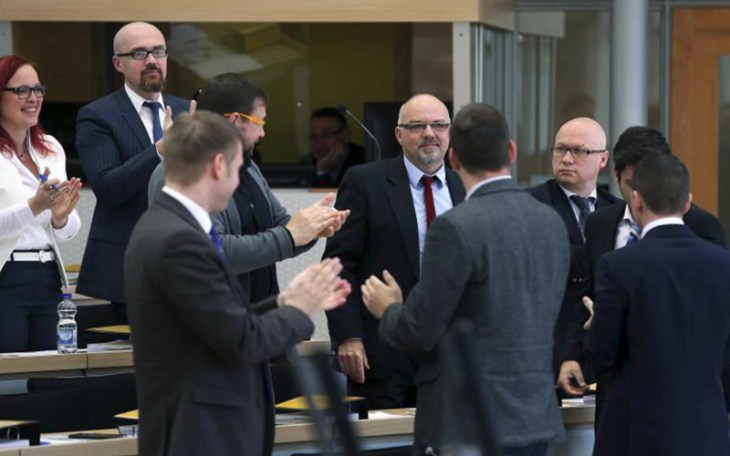The New Observer
April 15, 2016
The German state legislature of Saxony-Anhalt elected an Alternatief für Deutschland (AfD) vice-president this week after rebel members of Angela Merkel’s CDU party voted for him to defeat a far left candidate.
The election—which is bound to send shockwaves through German politics and disturb the government coalition even further—saw the AfD win 46 votes to the leftist’s 45.
The AfD has 25 seats in the 87-seat legislature, which means that 21 CDU members voted for the 52-year-old Daniel Rausch. Some 34 members voted against him, and the rest abstained.
Daniel Rausch (center) receives applause from the AfD group in the state legislature after winning the vice-presidency of the state of Saxony-Anhalt.
The far leftist Wulf Gallert, a member of Die Linke (“The Left”—which is actually just the “reformed” former East German communist party) expected to win the largely symbolic post in the first vote, but was shocked to only get 39 votes in the first round.
When the voting went to a second round, the CDU members—who had been given a free vote in the secret ballot—defected from their candidate to vote in the AfD man.
The CDU’s Hardy Peter Güssau was elected president of Saxony-Anhalt with 47 votes. The CDU has 30 seats, the AfD 25, the Left 16, the Socialist Party of Germany (SPD) 11, and the Greens 5.
Rausch said afterward that he did not expect to get so many votes, and that the result was a “surprise.” The AfD polled nearly 24 percent of the votes in Saxony-Anhalt’s recent state elections.
Previously, the state was ruled by a CDU-SPD alliance, which now appears to have broken down. Talks are reportedly underway to form a new coalition consisting of the CDU, SPD, and Greens—but the voting in of an AfD candidate by so many CDU members might have serious repercussions on such talks.
The German public broadcasting radio station, Deutschlandfunk, for example, ran an editorial saying that the CDU in Saxony-Anhalt was “playing with fire” by voting in the AfD candidate.
“The real problem with the election,” Deutschlandfunk said, “is that the right wing of the CDU has stretched out its hand toward their new right-wing populist parliamentary colleagues.”
They have done this, the editorial continued, in “order to show that they are not so far apart. That is frightening, because the AfD’s election program in Saxony-Anhalt is seen as nationalistic-oriented.”
Deutschlandfunk—which is state funded—went on to say in its editorial that it was clear that “parts of the CDU are also nationalistically-inclined.”
“These elements are dissatisfied with the decision to discuss a coalition with the SPD and the Greens, and are demonstrating that they can do without those [potential] partners. But this is a game with fire, because the AfD will move the political spectrum further to the right.”
Deutschlandfunk went on to point out that recent moves by the AfD’s delegates in the European Parliament were a “warning signal,” saying that one AfD deputy, Alexander Gauland, had speculated about an alliance with France’s Front National, an idea that the AfD has previously rejected.
In the interim, the AfD members have ultimately joined up with the group led by the British UKIP—a Eurosceptic group which is also hated by the establishment just because it is not far left on every political position.

